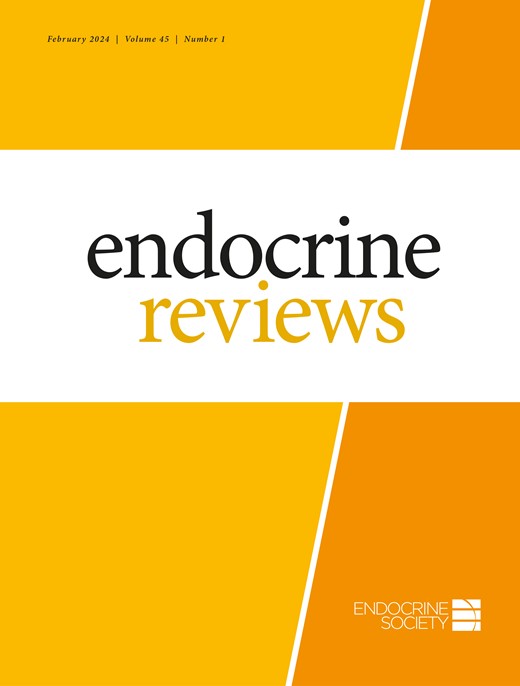Exogenous Opioids and the Human Endocrine System: An Endocrine Society Scientific Statement.
IF 22
1区 医学
Q1 ENDOCRINOLOGY & METABOLISM
引用次数: 0
Abstract
The use and misuse of opioids are a growing global problem. Although the effects of these drugs on the human endocrine system have been studied for decades, attention on their related clinical consequences, particularly on the hypothalamic-pituitary system and bone health, has intensified over recent years. This Statement appraises research data related to the impact of opioids on the gonadal and adrenal function. Whereas hypogonadism is well recognized as a side effect of opioids, the significance of their inhibitory actions on the hypothalamic-pituitary-adrenal system and the occurrence of clinically relevant adrenal insufficiency is not fully elucidated. The often-inconsistent results of studies investigating how opioids affect the secretion of GH, prolactin, arginine vasopressin, and oxytocin are assessed. The accumulating evidence of opioid actions on bone metabolism and their negative sequelae on bone mineral density and risk of fracture are also reviewed. In each section, available data on diagnostic and management approaches for opioid endocrine sequelae are described. This Statement highlights a plethora of gaps in research associated with the effects and clinical consequences of opioids on the endocrine system. It is anticipated that addressing these gaps will improve the care of people using or misusing opioids worldwide. The Statement is not intended to serve as a guideline or dictate treatment decisions.外源性阿片类药物与人体内分泌系统:内分泌学会科学声明。
阿片类药物的使用和滥用是一个日益严重的全球性问题。尽管人们对这些药物对人体内分泌系统的影响已经研究了数十年,但近年来对其相关临床后果,尤其是对下丘脑-垂体系统和骨骼健康的影响的关注却在不断加强。本声明评估了阿片类药物对性腺和肾上腺功能影响的相关研究数据。虽然性腺功能减退被公认为阿片类药物的副作用之一,但其对下丘脑-垂体-肾上腺系统的抑制作用以及临床相关肾上腺功能不全的发生的意义尚未完全阐明。对阿片类药物如何影响促肾上腺皮质激素、催乳素、精氨酸加压素和催产素分泌的研究结果进行了评估,这些研究结果往往并不一致。此外,还回顾了阿片类药物对骨代谢的作用及其对骨矿物质密度和骨折风险的负面影响的不断积累的证据。在每一部分中,都介绍了有关阿片类药物内分泌后遗症的诊断和管理方法的现有数据。本声明强调了与阿片类药物对内分泌系统的影响和临床后果相关的大量研究空白。预计缩小这些差距将改善全球使用或滥用阿片类药物者的治疗。本声明无意作为指导原则或决定治疗方案。
本文章由计算机程序翻译,如有差异,请以英文原文为准。
求助全文
约1分钟内获得全文
求助全文
来源期刊

Endocrine reviews
医学-内分泌学与代谢
CiteScore
42.00
自引率
1.00%
发文量
29
期刊介绍:
Endocrine Reviews, published bimonthly, features concise timely reviews updating key mechanistic and clinical concepts, alongside comprehensive, authoritative articles covering both experimental and clinical endocrinology themes. The journal considers topics informing clinical practice based on emerging and established evidence from clinical research. It also reviews advances in endocrine science stemming from studies in cell biology, immunology, pharmacology, genetics, molecular biology, neuroscience, reproductive medicine, and pediatric endocrinology.
 求助内容:
求助内容: 应助结果提醒方式:
应助结果提醒方式:


